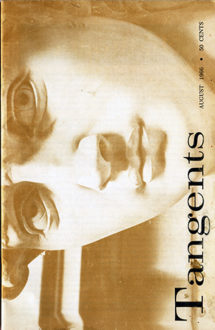 The Government is Not the Custodian of Morality
The Government is Not the Custodian of Morality
Editorial by Don Slater
Tangents
August 1966
Vol. 1 No. 11, pages 1, 26.
Originally published in the August 1966 issue of Tangents
The strongest defense for governmental censorship runs something like this:
Public morality is in bad shape. Smut and filth publishers and peddlers are on the loose. Most Americans are psychologically incapable of sorting out the decent from the indecent and of controlling their own emotions or sorting out their own thoughts. Somebody has to save the “normal man” from moral depravity. This responsibility must of course fall on government agents such as customs and post office officials, prosecuting attorneys and the police because these people are the only ones capable of discharging this power.
Whenever a book, magazine, newspaper, pamphlet, photograph, film, or advertising circular is conceived to be obscene by one of these agencies it is condemned and seized because it is not the moral fiber of the American public will be threatened and there will be an eventual collapse of the nation.

The argument continues with the acknowledgement that the government is aware that the state of affairs is unfortunate. The government would much rather not have to serve as censor; it would rather tend to the building of the Great Society. It is embarrassing, moreover, to have to serve as policeman in this regard—especially since the constitutionality of this police power has never been decided by the Supreme Court.
But there is no such thing as self-control when it comes to indecent or lascivious material because the “normal man” is not able to cope with libidinous thoughts, and because the smut peddlers purposely prey on weak and recipient minds.
This is the argument. These are the justifications. But they are palatable only to the government itself. The “normal reader,” to say nothing of the general public, is becoming less and less comfortable with this morally insidious and politically dangerous proposition.
The trouble with the rationale is that the basic question is never asked as to how it can be the proper function of a democratic government to intrude itself upon individual morality and compel a person to be saved from himself. The individual is never asked whether he wishes to be “saved” by governmental intervention. Nor is the question asked whether the person might not prefer to be rescued, if at all, by his minister or psychoanalyst. Such questions are not asked because they are embarrassing to any defense of censorship.
A government that sets itself up as custodian of the morals of its citizens must end by trying to conquer its citizens, because it will inevitably define as immoral or indecent anyone who tries to thwart its self-appointed mission. If we were to spend one-tenth of the money, energy and attention on resolving the feelings of guilt, shame or disgust—the moral conflict, the emotional chaos that we inflict on the public with our false moral values that we do on the exploits of the censor—we might not succeed in easing our national psychoses and sexual preoccupations, but we certainly could complain of our condition with a clearer conscience.
Thoughtful Americans are not looking for a self-appointed censor in their government. The younger generations, freed from old taboos and superstition concerning the role of sex in their lives, are not asking to be “saved” from indecent or lascivious material, and at least they are not asking to be saved by anyone else. The obscenity laws can only destroy free speech and the exchange of ideas and bring to bear the coercive powers of the state. Thoughtful Americans are asking for a way out of the sexual intolerance of the past into a tolerable future. By responding with censorship tactics our government shows that it has no grasp of the sexual realities of the 20th century. Its essential arguments in defense of censorship—and its methods—are those of an age that is gone.
©1966, 2018 by The Tangent Group. All rights reserved.

